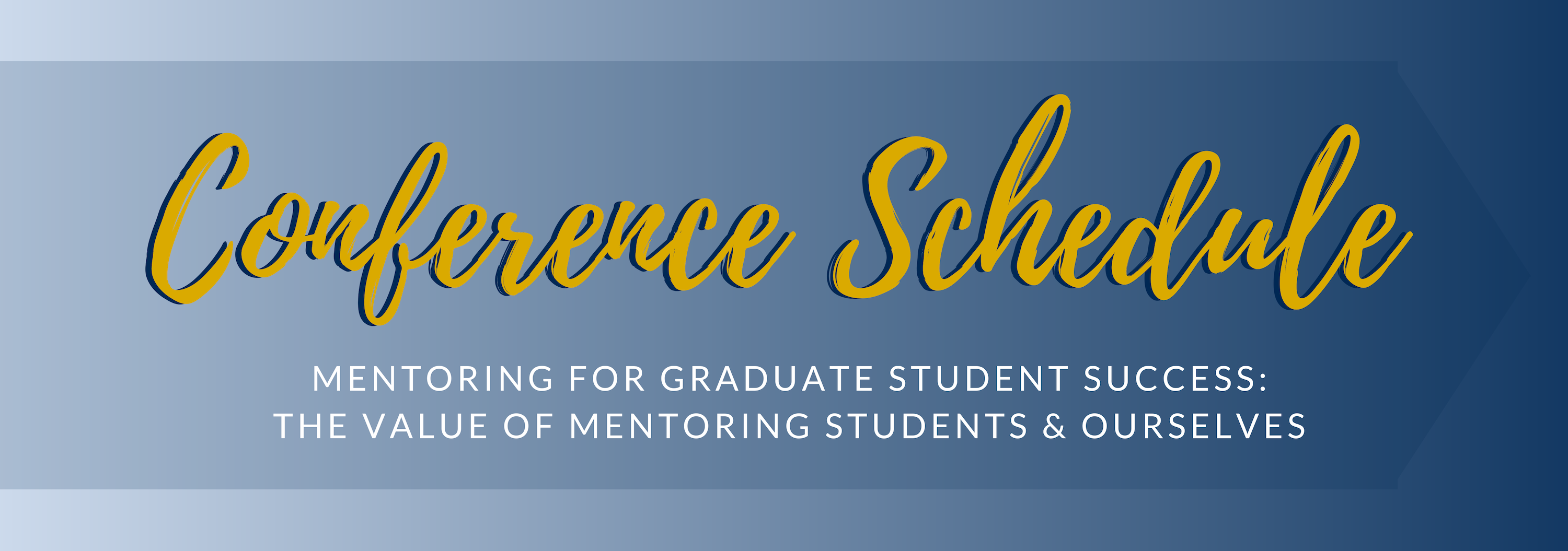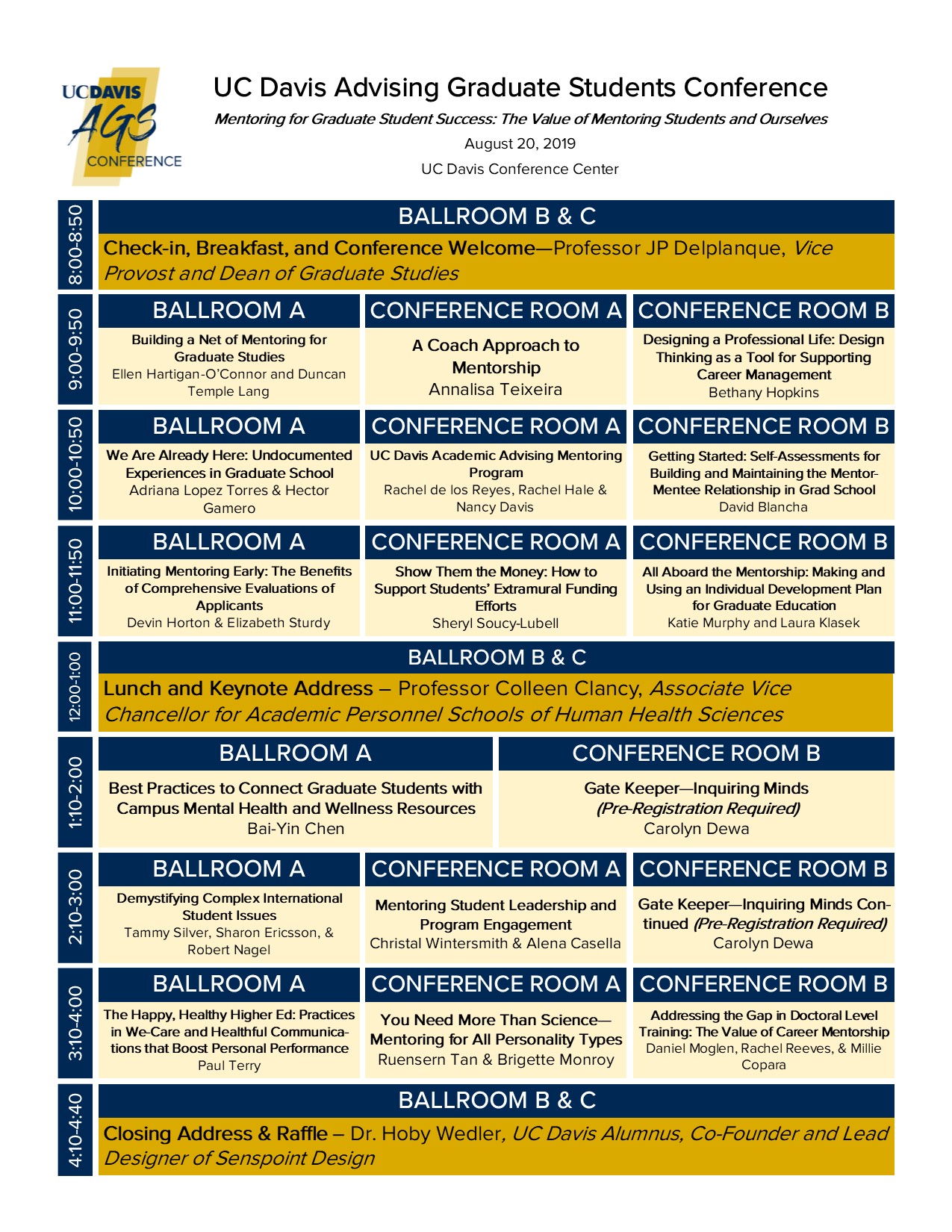

Mentoring Keynote Speaker - Colleen Clancy
9:00 a.m. Breakout Session 1
Ballroom A
Building a Net of Mentoring for Graduate Students
Presented by Ellen Hartigan-O'Connor and Duncan Temple Lang
Mentoring experts stress that people need multiple mentors to succeed in their careers. In this session, Duncan Temple Lang and Ellen Hartigan-O’Connor will lead an open discussion of how people with different expertise can best work together to support graduate student success. Focusing on four key roles: Major Professor, Graduate Advisor, Graduate Chair, and Graduate Coordinator, we will facilitate an exploration into the different roles and the current and best practices for sharing the responsibilities of mentorship.
Conference Room A
A Coach Approach to Mentorship
Presented by Annalisa Teixeira
Coaching is a one-on-one support model and communication style that is action- and solution-focused. A coach acts in partnership with their coachee, holding space for their self-reflection, goal setting, action planning, and progress monitoring through asking questions and active listening. In this workshop we will explore how coaching can be integrated into a student-centered mentorship model, first comparing traditional mentoring with integrated coaching-mentoring. To help faculty and staff better imagine how to apply an integrated model in their support of students, attendees will also have a chance to generate questions and role play.
Conference Room B
Designing a Professional Life: Design Thinking as a Tool for Supporting Career Management
Presented by Bethany Hopkins
How can design thinking promote a graduate student’s ability to launch a fulfilling career or be used for mentoring ourselves to reach personal career goals? Find out at this workshop facilitated by Internship and Career Center staff who work with master’s and PhD students. During this interactive session, you will learn how to support graduate students in designing their career and professional lives by focusing on the five qualities of a designer. A career toolkit aligned with the steps of design thinking will be presented. This session will help participants navigate conversations with graduate students as they process career options at the start, middle and end of graduate school. Furthermore, this workshop will present strategies for participants to apply design thinking to their own career management. Come prepared to think like a designer and learn approaches to helping graduate students launch meaningful careers.
10:00 a.m. Breakout Session 2
Ballroom A
We are already here: Undocumented Experiences in Graduate School
Presented by Adriana Lopez Torres and Hector Gamero
In this session participants will have the opportunity to engage with undocumented graduate students about their lived experiences at the university. We will begin with a presentation on legal terms, funding, and best practices for advising and supporting students. After which we will have a panel of graduate students that will answer questions and discuss the material presented for participants who are interested in learning more.
Conference Room A
UC Davis Academic Advising Mentoring Program
Presented by Rachel de los Reyes, Rachel Hale, and Nancy Davis
The focus of the presentation is to offer a unique professional development opportunity for graduate program coordinators and advisors. The Academic Advising Mentoring Program (AAMP) comes to you from the Office of Academic Advising, through the Advising Training and Professional Development Task Force (ATPD). AAMP was created to provide a structured environment for UC Davis advisors to develop a sustainable, engaging, and rewarding career that benefits the individual and the UC Davis community as a whole. AAMP also acts as an avenue for new advisors to begin to create their own advising network. Mentors will help mentees identify short and long term career goals and provide tailored support to personalize the mentoring program for each individual. This program serves to broaden connections and enhance engagement. The current chairs and members of AAMP would like to share information about the mentor/mentee roles, program objectives and outcomes in an engaging presentation.
11:00 a.m. Breakout Session 3
Ballroom A
Initiating Mentoring Early: The Benefits of Comprehensive Evaluations of Applicants
Presented by Devin L. Horton and Elizabeth Sturdy
This session will broaden our understanding of mentoring and emphasize the importance of implementing mentorship best practices as early as recruitment. The presentation will include information on how implementing holistic review can catalyze good mentoring by fostering the recognition of the comprehensive potential of applicants. To demonstrate the importance of collaborative efforts in implementing holistic review, we will showcase the grass-roots effort undertaken by the Graduate Program of Ecology graduate staff, faculty, and graduate students to create an effective mentoring initiative.
Conference Room A
Show Them the Money: How to Support Students’ Extramural Funding Efforts
Presented by Sheryl Soucy-Lubell
Are your graduate students in search of external funding opportunities to support their research and scholarship? Do you want to learn more about how to help them maximize their potential for success and improve their proposal development process?
During the first half of this 50-minute workshop, grant writing experts from the Office of Research will introduce faculty and staff to the fast-growing world of Research Development, a professional field designed to support researchers and scholars of all disciplines and levels in their pursuit of extramural funding. Facilitators will then engage participants in an interactive brainstorming session to accomplish the two essential steps of advising students in extramural funding efforts: (1) identifying the skills that contribute to grantsmanship success, and (2) familiarizing themselves with the resources and support already available to grow those skills at UC Davis.
Conference Room B
All Aboard the Mentorship: Making and using an individual development plan for graduate education
Presented by Katie Murphy and Laura Klasek
An Individual Development Plan (IDP) is a document to guide graduate and professional students in their journey through graduate school and prepare them for life beyond. Two graduate students, Katherine Murphy and Laura Klasek, developed a customized IDP for the UC Davis Plant Biology Graduate Group to guide students and their faculty mentors navigating the waters of mentorship, goal setting, and professional development. Here they will describe the IDP, how they constructed the document, the process of student-driven “mentoring up,” and how to help students find success using an IDP.
1:10 p.m. Breakout Session 4
Ballroom A
Best practices to connect graduate students with campus mental health and wellness resources
Presented by Bai-Yin Chen
The growing mental health concern in graduate and professional school education calls for graduate program faculty and staff to play a critical role in bridging their graduate students to the campus support resources. In order to meet the demands of mental health services Student Health and Counseling Services has expanded the mental health and wellness resources over the years. This workshop will provide a summary of common mental health concerns among graduate students, address common myths of access to services, and use case scenarios to engage participants to develop best practices in connecting graduate mentees to various campus mental health and wellness resources.
Conference Room B
Gate Keeper – Inquiring Minds (Pre-registration required)
Presented by Carolyn Dewa
This training will be using The Inquiring Mind. The Inquiring Mind is a program designed to teach learners to recognize the range of mental health problems and the campus resources to which students can be referred.
2:10 p.m. Breakout Session 5
Ballroom A
Demystifying Complex International Student Issues
Presented by Tammy Silver, Sharon Ericsson, and Robert Nagel
The political climate has created confusion about how enrollment and employment issues may impact international students’ immigration status. This workshop will explore themes pertaining to unsatisfactory progress, PELP and when students can stay in the United States and when they must travel, and how new policies--and interpretations of old policies--have resulted in changes to SISS work authorization policies.
A presentation panel of seasoned SISS international student advisors will briefly present on each theme after which participants will have the opportunity to work in groups on cases. There will be time for each table to report out how they would approach their case to all participants.
Conference Room A
Mentoring Student Leadership and Program Engagement
Presented by Christal Wintersmith and Alena Casella
In this session we will discuss best practices for mentoring students to become program leaders and the creation of student driven activities that foster peer mentoring, advancement of program knowledge, and social support. We will focus our round table discussion on which activities have been proven successful and how can they be implemented. We will explore how Graduate Program Coordinators and program leadership can encourage and support students to take the initiative to improve their program. We will review options for student association structure and discuss how to maintain active student involvement.
Conference Room B
Gate Keeper – Inquiring Minds (Session continued – prior registration required)
Presented by Carolyn Dewa
This training will be using The Inquiring Mind. The Inquiring Mind is a program designed to teach learners to recognize the range of mental health problems and the campus resources to which students can be referred.
3:10 p.m. Breakout Session 6
Ballroom A
The Happy, Healthy Higher Ed: Practices in We-Care and Healthful Communications That Boost Personal Performance
Presented by Paul Terry
Wellness is an active process of becoming aware of and making choices toward a healthy and fulfilling life, and area often placed on the back burner or as a lower priority. In this session, we discuss concepts around We-Care, a strategy that integrates self-care throughout our work and lives. Participants will learn how we can extend beyond our physical places to improve efficient ways for collaboration and communication and leverage our efforts through our virtual communities.
Conference Room A
You need more than science – Mentoring for all personality types.
Presented by Ruensern Tan & Brigette Monroy
“Like the science, that’s all that matters” has been given as advice for generations of scientists. However, the pursuit of knowledge does not appeal to all personality types. By adopting a singular mentoring style we risk demotivation, conflicts, and eventually loss of talented researchers. This workshop uses a personality-based model as a framework to equip mentors with the tools necessary to motivate mentees. We begin by having participants take self-assessments. By comparing results, we will better understand how diversity in personality types can enrich the research environment. Then participants will learn to quickly determine personality types through directed questioning focusing on “pivot points”. Finally, participants will apply their knowledge to case studies to determine motivational and demotivational methods of approaching personality types in the workplace.
Conference Room B
Addressing the Gap in Doctoral Level Training: The Value of Career Mentorship
Presented by Daniel Moglen, Rachel Reeves, and Millie Copara
Even as the great variety of careers won by PhD alumni becomes more visible, the assumption of a tenure-track research professorship continues to shape graduate training. Because graduate advisors play an important role in mediating career conversations, and in consideration of graduate students who either intentionally leave the academy or are pushed out, it is increasingly essential to centralize and normalize conversations about non-faculty careers. This institutional culture shift must go beyond conversations by actively creating bridges that facilitate transitions into careers outside of academia. One of the key ways forward is to promote, encourage, and provide frameworks for career mentorship, which would support and enhance preexisting doctoral training programs. This session will bring forth conversations around how this can happen.
